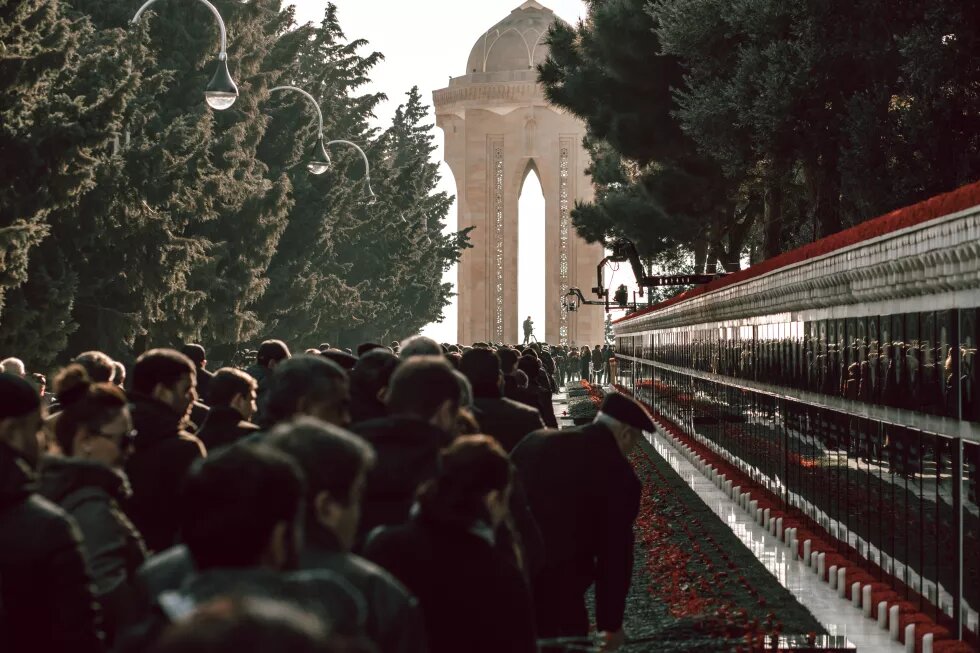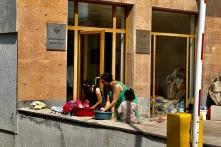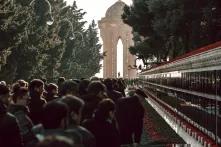The psychological trauma inflicted on Azerbaijani society by the Karabakh conflict has not yet been processed; moreover, it has not been fully realized. The return of territories not only failed to heal these injuries but apparently sparked new fears in society.

The 1990s in Russia are commonly referred to as the “wild nineties.” Although there is no accepted term for this period in Azerbaijan, one could simply call it the “decade of frustration.” The supposed joy of gaining independence was almost completely overshadowed by the Armenian-Azerbaijani conflict, the Karabakh conflict, the January 20 tragedy and the defeat in the Karabakh war, followed by the loss of Nagorno-Karabakhand its surrounding regions. These events, to a greater or lesser extent, inflicted psychological trauma on the entire population of the country — at the time an unprocessed and unrecognized trauma that later formed the basis of the national idea.
First of all, in the 1990s, the concepts of “psychological trauma” and “psychological support” were known only to a handful of specialists in Azerbaijan. Secondly, there was no time for psychology — all efforts were focused on physical survival in the ruins of the Soviet Union, which had also been torn apart by the whirlwind of war. The assistance provided to almost one million Azerbaijani refugees from Armenia and forcibly displaced people from Karabakh was very limited. The government, with the aid of international organizations, managed to help them materially, albeit not morally. It was still uncertain what had traumatized them more: the war itself or its aftermath, marked by helplessness, poverty and dependence on the mercy of others.
The wounds imprinted on the souls and minds of these people healed by themselves and left scars that they eventually stopped noticing. This article is based on the stories of several women who survived the Karabakh conflict and managed (or failed) to cope with psychological trauma on their own. Their testimonies will offer at least a glimpse into the often hidden face of women’s trauma in Azerbaijan.
Strangers in Their Own Land
Nazrin[1] was 10 years old when a flood of forcibly displaced people poured into Baku. She remembers well how the locals treated them.
“I am not sure about adults but as for children, they often used the word “refugee” in a pejorative sense. Moreover, even Russian-speaking people for some reason used this word only in Azerbaijani — gachgyn (qaçqın). Refugee children were teased in this way. Some girl could say about another girl that she was “dressed like a gachgyn,” that is poorly dressed. Now I understand how cruel it was… But children don’t realize that it’s unacceptable to use certain words and in those years they were rarely scolded or taught that it wasn’t allowed. Of course, many adults felt for the forcibly displaced people, but times were hard for everyone; it was difficult to find enough mental strength to empathize with others. Besides, for the inhabitants of Baku, once a cosmopolitan city, the displaced people from Karabakh were strangers or provincials. Many of them negatively perceived the mass influx of people from the regions to the capital, even though they hadn’t come to Baku of their own free will.
Later, many people told me how they were offended by this attitude. It was painful especially for men who were also blamed for fleeing, failing to defend their land and giving it away.”
Aynur was born in Baku but spent the first five years of her life with her grandparents in Zangilan. After she started school, she would visit them during winter and summer vacations.
“Life went on as usual until I was thirteen, that’s when the war started. My childhood was divided into “before” and “after.” First of all, the village that I considered a second home suddenly became inaccessible. Then Zangilan was invaded and my grandparents and uncles with their wives and children — all our relatives we used to visit — came to us. Childhood was actually over for me then.
We had a large four-room apartment but it was so crowded that it was literally impossible to move around because of the mattresses spread out on the floor. I was already a teenager, I needed attention and care but my parents were preoccupied with other problems.
I analyze and understand much of what happened then only now. For example, I understand why my relatives were always fighting or arguing over a carpet they didn’t manage to take with them. Or a vase. Not willing to accept that they had lost everything, they kept sweating the small stuff.
Girls from Karabakh
Zohra graduated from school in 1992. But she didn’t celebrate her graduation from school.
“At that time, several dozen soldiers from our district were surrounded and killed. One of them was from our village. Grief and mourning… we had no time for the graduation ceremony. But we were ready to sacrifice our own pleasures for a common cause. The last bell wasn’t worth talking about. In a way, even my marriage was an act of self-sacrifice.”
Her marriage took place only after the war and resettlement. Zohra was 24 years old, when she met her future husband, a 29-year-old Karabakh man who had lost an arm in the war.
“I thought that by marrying him I performed an act of heroism… For me, it was a noble and selfless act: a young woman marries a veteran who lost his arm in the war in which they both lost their homeland... ”
Zohra herself was also wounded; at the age of seventeen she was hit by a blast wave from a nearby mine explosion.
“A broken rib punctured my lung. I had an operation but I still have breathing problems as well as a fear of sharp sounds, knocks and sudden screams. Whenever I hear something like that, I get scared.”
Günel Mövlud, a writer, also speaks about her fear of sudden and unidentified sounds. When she was 11 years old, she left the Jabrayil district with her parents and brothers. For the next 5 years they lived in a tent-camp until Günel’s father, who had gone to Russia for work, bought them an apartment in Sumgait. Due to the meager and low-quality food rations of those years, Günel suffers from Crohn’s disease, a chronic inflammation of the gastrointestinal tract. Most of her relatives who lived in the camps have various gastrointestinal diseases.
“I still have a fear of hunger. I feel calm and secure only when the fridge is full to the brim. I always cook a lot. I am pleased when people around me are well-fed. Perhaps this is even a positive consequence...”
Another positive consequence of living in a camp, according to Günel, is that it developed her social skills: she gets along with others and communicates easily.
A few years ago, Günel Mövlud wrote the autobiographical novel “The Camp” (in Russian translation — “A Girl from Karabakh”).
“This novel is the summation of my psychological traumas. While the memories, resentment and pain were still fresh in my mind, I could hardly talk about everything openly and impartially. As soon as I was able to cope with them all, I wrote a book to close this chapter in my life.”
“Fears Began to Mount Gradually”
When the First Karabakh War broke out, Gulnara was a married woman, mother of two children, living in the Aghdam district which she did not want to leave until the last moment.
“When the conflict started in 1988 and the Armenians spoke out in favor of Karabakh’s secession from Azerbaijan, we didn’t believe that they were quite serious about it. 70 years of peace and suddenly this happened… We couldn't imagine that we were enemies now. That’s why at first we were not even afraid. Fears began to mount gradually. Over time we got used to it. ”
Gulnara’s family lived in such a state until the summer of 1993.
“For several years there was constant shelling. At first we didn’t hide, we would go outside and watch the sky glow. We got scared only when we heard an explosion. Then we started hiding in the basements of our houses. At night when we went to bed, we kept bags with our papers and children’s things on hand, in case we had to run away. And poison, in case we failed to escape and were captured. All this had its consequences; we got diabetes, hypertension, nervous diseases.”
Gulnara recalls how one day she left in a hurry to visit her neighbors who had picked up the bodies of their dead relatives and soon heard her son’s piercing scream outside.
“The poor child came from school, saw the unlocked door and empty house, and thought that we had been taken and he was all alone. Actually, I feel especially sorry for my son. My daughter was an infant, but my son was a schoolboy, he understood everything. After we left the village in [19]93 and lived in different temporary shelters, he changed five or six schools. He studied intermittently, here and there… I think that the fears and hardships experienced during the war and in the following years traumatized him very much. But no one offered us or our children any psychological support. To be honest, we didn’t expect it.”
Gulnara is now 66 years old. Since Karabakh has been reclaimed, she hopes to spend the rest of her life in her native village. However, her family does not know yet when exactly they will be able to move back to Aghdam. In mid-March 2024, Azerbaijani media outlets reported that the Ministry of Health of Azerbaijan, together with the World Health Organization (WHO), launched a project to provide psychological support for the integration of citizens who have returned to live in the liberated areas. It is not specified though what exactly this support involves.
Forcibly displaced people from Karabakh met different fates, depending on many circumstances: from the presence of supportive relatives in other regions to personal skills and luck. Some of them eventually got back on their feet, built new homes, provided an education for their children and started a new life… Others still live in dilapidated dormitories or self-builds. First they waited for their turn to get an apartment from the government. Now they are waiting their turn to move back to Karabakh. However, resettlement proceeds at a slow pace and may take years. According to official statistics, as of October 31, 3,200 people have been resettled in different districts. A total of 140,000 people are expected to move back during the first phase of the “Great Return” program, which is scheduled for 2022-2026. After the Armenian exodus from Nagorno-Karabakh in the fall of 2023, the question of their hypothetical return (on condition that they obtain Azerbaijani citizenship) hangs in the air. Nevertheless, no one believes that Armenians and Azerbaijanis will be able to coexist together in the foreseeable future.
Winners Don’t Cry (?)
As a matter of fact, nobody believed that Nagorno-Karabakh would be regained either, although it had been “a national dream” for decades. Now that this dream has come true, psychological traumas (as well as casualties and other related problems) fade into the background.
It is inappropriate for a winner to complain. “What’s the point of complaining?” asked politicians and a substantial part of society on social media, “We reclaimed our lands, restored “historical justice” and removed the stigma of being a loser…”
The heavy losses suffered by Azerbaijan in the last war are presented as the inevitable price of victory. It is emphasized that this time the blood was not spilled in vain. The families of the fallen soldiers are invited to think about the war from this perspective.
In the fall of 2020, Sara waited in vain for her son’s return from the army. His service was supposed to end on September 28. However, on September 27, war broke out and the boy was sent to the front where was killed by mortar fire. Even after more than three years, Sara cannot reconcile herself to the loss of her son.
“Suleyman was our firstborn. He was born five years after our marriage. When it happened, we sacrificed a lamb. We didn’t know that one day we would sacrifice him too. What was this sacrifice made for? For the land that was lost before he was born? Why did Suleyman have to die for Karabakh which he had no connection with? To me, this makes his death even more unfair.”
Their family received generous compensation from the government. Sara has two other sons and a young grandson named after Suleyman. But she says no one and nothing can fill the void in her soul.
“They say that I shouldn’t torture myself, I have other children and they need me… I understand but I can’t help myself. After Suleyman’s death I stopped living. I breathe, sometimes I even laugh… But I don’t live. They tell me to see a psychologist but it’s a waste of time. I don’t believe it will do any good. No psychological support or therapy will heal this wound.”
For eight months during and after the Second Karabakh War, sociologist and feminist Sanubar Heydarova was part of a volunteer group working with people evacuated from areas bordering the war zone.
“We tried to find out and if possible, meet their most urgent needs. Most of them didn’t suffer physically but due to stress almost all of them developed a whole bunch of nervous and psychosomatic disorders. Of course, those who were already sick suffered the most, namely people who had heart disease or cancer… Stress worsened their condition, while therapy became temporarily unavailable. Even perfectly healthy women complained of various pains, cystitis, cessation of menstruation, insomnia, etc.”
Children’s mental health was also affected: infants cried constantly, older children became more cranky, afraid to sleep or go outside alone, and their cognitive abilities declined sharply. This, in turn, made already distraught mothers even more nervous and anxious.
“Of course, most mothers understood that their children were not to blame for anything but under the circumstances they couldn’t be patient and yelled at them... Men also felt stressed and took it out on their wives and children. Family quarrels became habitual, everyone was irritable… And all this was aggravated by sleep disturbance. The psychiatrists and neurologists who came with us prescribed medicine to many of them to relieve their anxiety a bit.”
Survivors Who Didn’t Want to Live
In 2022, Azerbaijani media outlets and social platforms every now and then reported about yet another suicide of a participant of the Second Krabakh War. Rough estimates suggest that at least 30 veterans committed suicide within 1.5-2 years after the end of the war. Subsequently, the suicide rate has somewhat declined and the topic fell off the agenda. However, it doesn’t mean that there are no more suicides.
According to family members, the main reason for suicides is the challenging social circumstances in which yesterday’s heroes found themselves — problems with disability registration and financial support, unemployment, etc. Meanwhile, the authorities and numerous social users tend to attribute this wave of suicides to post-traumatic stress disorder (PTSD), which is almost inevitable for war survivors.
“When financial and social factors superimpose on moderate or severe PTSD, a person becomes entrapped by one’s own aggression which may be directed against others or against oneself. Such auto-aggression often leads to suicide,” says Azad Isazadeh, a psychologist with years of experience in rehabilitating veterans.
In his opinion, a serious and comprehensive approach to psychological rehabilitation of war veterans is needed to solve the problem. Although such centers exist in Azerbaijan, there are only a few of them, mostly located in big cities. People living in the regions cannot reach them, not to mention the fact that many veterans have to be persuaded to see a psychologist; in conservative societies, men who fought in the war consider it unworthy, almost shameful.
However, according to Azad Isazadeh, empathy is just as important as psychological support.
“All the veterans I talked to were also deeply traumatized by the fact that government officials don’t sympathize with them, most often brushing them aside or sending them off to other offices. It’s a mistake that leads to tragedies.”
A New Fear
As in the 1990s, Azerbaijan today is not concerned with psychological traumas. There are more pressing problems. The only difference is that they are now quite pleasant: restoration of critical infrastructure and resettlement in the liberated territories. This historic opportunity to start a new life should improve the psychological well-being of forcibly displaced people and society as a whole.
Only time and serious research will tell whether this is the case.
If such studies are conducted.
And if everything goes as planned and promised by the authorities.
But perhaps the most serious psychological consequence of the 2020 war and subsequent escalations for Azerbaijani society is the fear that the war is not really over and will never end. That a new escalation could happen at any moment.
For 30 years, the Karabakh conflict has been a kind of sleeping dragon. Now it has awakened. This fear, fueled by the media and social platforms has gripped ordinary Azerbaijanis, even those who have no connection with Karabakh. The war in Ukraine also intensified this fear which every now and then seeps into everyday conversations…
… In a small beauty salon in Baku, a nail technician puts the finishing touches on a client’s pedicure.
“Well, there you go... This will last a month. In May, when you start wearing sandals, come, I’ll refresh and varnish them, God willing. Just let there be no war …”
[1] All the names in the text have been changed.

